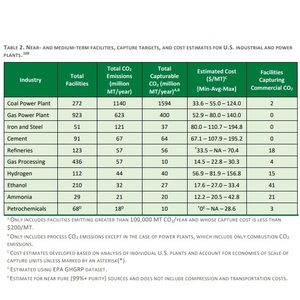DOE roadmap highlights the potential of CCUS at ethanol plants

September 8, 2022
BY Erin Krueger
The U.S. Department of Energy on Sept. 7 released its Industrial Decarbonization Roadmap. The document, in part, identifies U.S. ethanol plants as among the lowest-cost industrial facilities for the implementation of carbon capture, utilization and storage (CCUS) technologies.
The report indicates the 210 ethanol plants located in the U.S. emit approximately 32 million metric tons of carbon dioxide per year. An estimated 27 million metric tons of that carbon dioxide could be captured via CCUS technologies, according to the DOE, at a cost of $17.60 to $33.40 per metric ton, with an average price of $27 per metric ton. In addition, the report shows that ethanol plants already account for 41 of the 104 U.S. industrial facilities currently capturing commercial carbon dioxide.
The roadmap includes similar data for CCUS implementation for coal power plants, gas power plants, iron and steel plants, cement plants, oil refineries, gas processing facilities, hydrogen plants, ammonia plants and petrochemical facilities. The estimated cost per ton for these facilities ranges from a low of $12.20 per metric ton at certain hydrogen facilities to a high of $195.20 per ton at certain cement plants.
Overall, the Industrial Decarbonization Roadmap identifies four key pathways to reduce industrial emissions from American manufacturing, including through the use of biofuels, biobased feedstocks and carbon capture and storage (CCS). The roadmap emphasizes the urgency of dramatically cutting carbon emissions and pollution from the industrial sector. It also presents a staged research, development and demonstration (RD&D) agenda for industry and government.
Advertisement
The DOE estimates that the industrial sector accounted for approximately one-third of all domestic greenhouse gas (GHG) emissions last year—more than the annual emissions of 631 million gasoline-fueled passenger vehicles.
The roadmap specifically focuses on five energy-intensive sectors where industrial decarbonization efforts can have the greatest impact, including iron and steel; cement and concrete; food and beverage; chemical manufacturing; and petroleum refining. The four key pathways to reduce industrial emissions include energy efficiency; industrial electrification; the use of low carbon fuels, feedstocks and energy sources (LCFFES); and CCUS.
The LCFFES pathway focuses on substituting low- and no-carbon fuel and feedstocks to reduce combustion-associated emissions for industrial processes. This includes the development of fuel-flexible processes; the integration of hydrogen fuels and feedstocks into industrial applications; and the use of biofuels and biobased feedstocks.
Advertisement
Also on Sept. 7, the DOE issued a $104 million funding opportunity announcement (FOA) that aims to advance industrial decarbonization technologies. The FOA focuses on six topic areas, including technologies to decarbonize chemicals; decarbonize iron and steel; decarbonize food and beverage products; decarbonize cement and concrete; decarbonize paper and forest products; and cross-sector decarbonization technologies. The FOA specifically addresses the use of low carbon fuels, including biomass/biofuels and waste or refuse-derived fuels, as a way to decarbonize cement and concrete production. Concept papers for the FOA are due Oct. 12, with full applications due Dec. 20.
Additional information, including full copies of the roadmap and FOA, are available on the DOE website.
Related Stories
Avfuel Corp., the leading independent supplier of aviation fuel and services, is expanding its sustainable aviation fuel (SAF) footprint with the addition of a new, strategic supply point in Denver, Colorado—the first of its kind in the region.
CVR Energy Inc. on July 30 reported its renewables segment achieved increased throughput during Q2 despite unplanned downtime but reported a net loss of $11 million. The company expects to retroactively claim the 45Z credit for volumes produced.
Total U.S. operable biofuels production capacity expanded in May, with gains for renewable diesel and a small decrease for ethanol, according to data released by the U.S. Energy Information Administration. Feedstock consumption was up.
SAF-producer XCF Global Inc. on July 28 announced it has signed an exclusive, non-binding indication of intent (IOI) with a renewable fuels infrastructure and feedstock solutions company based in the western U.S.
The European Commission on July 28 approved a €36 million ($41.07 million) Danish state aid scheme designed to encourage airlines operating in Denmark to use sustainable aviation fuel (SAF) on domestic routes.
Upcoming Events










